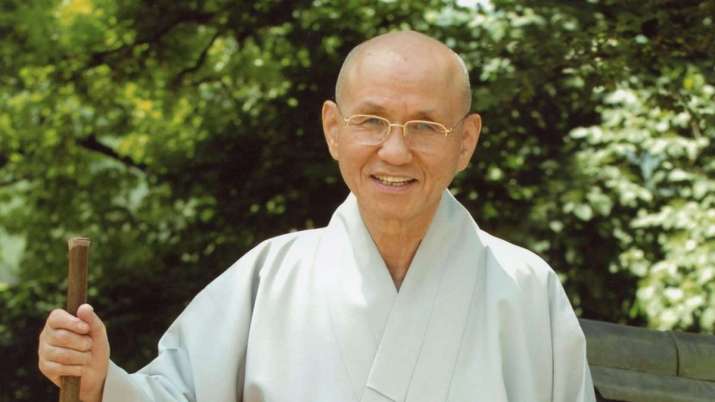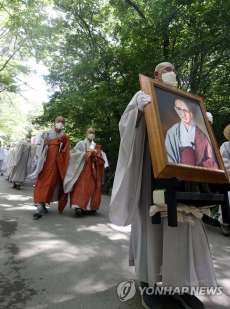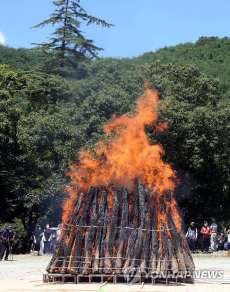NEWS
Ven. Wolju, Social Activist and Former Leader of Korea’s Jogye Buddhist Order, Dies at 87
 Ven. Wolju Sunim, 1935–2021. From tellereport.com
Ven. Wolju Sunim, 1935–2021. From tellereport.comVen. Wolju Sunim,* former head of the Jogye Order of Korean Buddhism, South Korea’s largest Buddhist order, and a noted social activist, died on the morning of 22 July at the age of 87.
The respected monk is reported to have died at 9:45am on Thursday last week, at the 1,400-year-old Geumsan-sa (Golden Mountain Temple) in North Jeolla Province, where he served as abbot and later as spiritual master. Ven. Wolju Sunim had been receiving hospital treatment for pneumonia this year before returning to Geumsan-sa early on Thursday to spend his final hours.
The Jogye Order is a school of Seon (Zen) Buddhism that traces its roots back some 1,200 years to the Unified Silla (also known as the Later Silla) kingdom (668–935). The Jogye school as a distinct entity emerged in the late 11th century when the monk Bojo Jinul, credited as the school’s founder, sought to combine Seon practices with the theological underpinnings of sutra-based Buddhist schools, including Korean Pure Land Buddhism. The order now represents the largest segment of South Korea’s Buddhist population, administering about 1,900 active temples, more than 13,000 monastics, and seven million lay followers nationwide.
 A funeral procession for Ven. Wolju Sunim at Geumsan-sa earlier today. From yna.co.kr
A funeral procession for Ven. Wolju Sunim at Geumsan-sa earlier today. From yna.co.kr Buddhist monks and mourners attend the cremation of Ven. Wolju Sunim at Geumsan-sa earlier today. From yna.co.kr
Buddhist monks and mourners attend the cremation of Ven. Wolju Sunim at Geumsan-sa earlier today. From yna.co.krVen. Wolju Sunim was born in 1935 in North Jeolla Province and was ordained as a Buddhist monk in 1954 in Beopju-sa, a mountain temple in North Chungcheong Province. He led a national campiagn of purification for Korean Buddhism in 1961 and emphasized socially engaged Buddhism, participating in various civic groups and initiatives.
In 1980, Ven. Wolju Sunim was elected as the 17th president of the Jogye Order of Korean Buddhism, but later that same year was arrested and forced to step down by the military government of Chun Doo-hwan amid a crackdown on Buddhism. Subsequently, he engaged in social welfare and social reform activities, and working toward peace between North and South Korea.
Ven. Wolju Sunim returned to lead the Jogye Order in 1994, resuming his focus on social engagement. He also led a foundation that ran a nursing home, the House of Sharing, for elderly Korean women who were forced into sexual slavery for Japanese troops during World War II. After retiring, Wolju Sunim founded an international NGO for local development and education in developing economies in Africa and South America.
A funeral ceremony and cremation were held today at Geumsan-sa after five days of memorial services.
According to census data for 2015, the majority of South Korea’s population—56.1 per cent—holds no religious affiliation. Christians make up the largest religious segment of the population at 27.6 per cent, while Buddhists account for 15.5 per cent.
* Sunim is a Korean title of respect for Buddhst monks.
See more
Jogye Order of Korean Buddhism
Geumsan Temple
Former chief of S. Korea's largest Buddhist sect, social activist dies (The Korea Herald)
Ex-chief of largest Buddhist sect dies (Yonhap News Agency)
Former chief of S. Korea's largest Buddhist sect, social activist dies (Yonhap News Agency)
Funeral for senior monk (Yonhap News Agency)
Venerable Wolju, Former President of the Jogye Order Dies (The Kyunghyang Shinmun)
Related news reports from Buddhistdoor Global
Engaged Buddhism: Ven. Pomnyun Sunim Delivers Compassion to the Vulnerable in Korea
Buddhist Temple to Open Tripitaka Koreana to the Public for the First Time
UPDATE: South Korean Buddhist Temple Enshrines Buddha Statue Gift from India
Korea Cancels Annual Buddhist Lantern Festival for a Second Year amid Pandemic Caution
Jogye Order of Korean Buddhism Condemns Myanmar Military in Solidarity with Pro-Democracy Movement
Related features from Buddhistdoor Global
Engaged Buddhism: Seon Master Pomnyun Sunim Pledges 10,000 Tons of Food Aid for Children in North Korea
My Journey on the Path of Won Buddhism
Seon and the City














